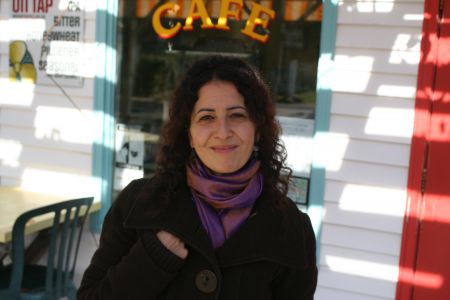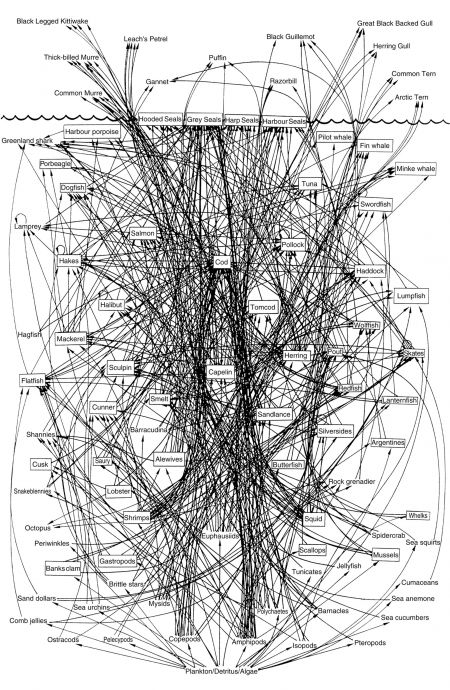Cod stocks in the Atlantic, after hitting rock bottom more than twenty years ago, are not recovering, and scientists believe that extinction continues to be a real possibility for at least some of the stocks.
A new and meticulously researched book, the Devil and the Deep Blue Sea, written by Nova Scotia author Linda Pannozzo, considers reasons for the slow recovery of the cod. And those reasons are not the ones many politicians, government scientists and fishers subscribe to.
Many consider the grey seal to be the main culprit for the slow recovery of the cod. Unlike cod, grey seal populations off our coasts have shown a huge increase over the last four decades. Estimates of the grey seal population off our Atlantic shores range between 330,000 and 410,000.
It is tempting to draw a connection between the two phenomena. Cod stocks not recovering. Grey seals, who have been known to eat cod, recovering with a vengeance. And with that connection drawn, the solution becomes obvious. Get rid of the seals, and the cod will return.
It's a logic most politicians and many fishers enthusiastically embrace. For instance, in 2012 the Senate approved a plan to cull 70,000 grey seals in the Gulf of St. Lawrence.
Pannozzo doesn't believe it is simply a matter of seal versus cod.
"When you get rid of the seals you get more cod, that's the way the media has portrayed it, for the most part," Pannozzo tells the Halifax Media Co-op. "I wanted to engage the complexity."
Pannozzo's book impresses on the reader that nothing is simple when it comes to a vast ecosystem such as the Northern Atlantic, and that there are very few conclusions we can draw about that ecosystem with any degree of certainty.
Scientists disagree on how much cod seals eat. It is also not clear whether current grey seal numbers are at an all time high or simply reflect a recovery to prior levels.
To what extent ocean acidification, ocean warming, bottom trawling, and major changes in the entire ocean's ecosystem contribute to the cod's slow recovery is a question few are even willing to consider.
Pannozzo's book raises many more questions like these, and it would be a fascinating read for the tough questions it raises alone.
But the book goes further. It considers why politicians and governments are so eager to point to seals as the main culprit for the slow cod stock recovery. And what this obsession with the seal has meant for scientists who work for the federal government.
And in its final chapter it describes an economic system and a way of thinking that seemingly leaves us no choice but to continue, if not accellerate, the very same practices that have already caused such devastation.
The Halifax Media Co-op met up with Linda Pannozzo to explore these issues a bit further.
HMC: The overriding theme of the book appears to be the complexity of the ecosystem that supports life in the northern Atlantic. Is there an example of that complexity that stands out for you?
LP: There is a graphic in the book that paints the picture for me, it's the illustration that shows the food web. And mind you, it is only a partial depiction.
Contrast that with the scientific studies that have been done about seals and cod and how they interact. And that is all they include, how seals and cod interact. These studies are called two-species models, and these models are predominant.
How could we say that these two-species models represent reality when it is not even close? If you do it that way it will look like the grey seal eats a lot of cod, but it is just the way the model is designed.
HMC: In your book you argue that politicians are eager to reduce all that complexity to a simple seal vs cod issue. Why do they do that?
I think it is about votes. In my book Howard Epstein describes how in the early days of the NDP government they were going to change the law so as to allow commercial seal hunting on Hay Island, which is a protected area. After hearing all these submissions by experts the Law Amendment Committee decided not to change the law. But then they were told that this is a matter of votes, we don't want to lose the fishing vote. And the law was changed.
Another example: since the cod fishing moratorium was initially implemented there have been exceptions and fishing of a number of the stocks has been permitted. That has always been against scientific advice. That was to placate people who wanted to fish for cod.
You can see the politics in those examples. In the book I get into other hypotheses why the fish may not be doing well. If you were actually to try to address those things than you would have to change the fisheries, you'd have to change the way it is executed, you'd have to change so many things about it, and politicians don't want to do that.
HMC: You also talk about government actively shaping the government-sponsored science that supports that seal vs cod narrative. Can you talk about that?
It is not that each individual study is wrong. What happens is that the policy gets created at the top, probably in conjunction with the fishing industry, together they set the agenda.
As a result they are not looking at trawling, they are not looking at the effects of climate change, not really, and they are not looking at acidification. There is a concerted effort to look at grey seals instead. You end up with all this information about one thing.
HMC; So what should we do to address these larger issues?
The whole language, of fisheries management of a stock, of having a maximum sustainable yield, and so on, is geared towards satisfying the investment and the need for profit. Our system does not look at values, ecological services, the intrinsic value of any animal species, we just look at what we can get by selling them, the market value, that's the only value.
I don't think there is one solution. There has to be a move away, a revisioning of our economic system. It doesn't work anymore, it works for the elite but it doesn't work for the majority of the people and it doesn't work for the planet.
How do we change that? We have to re-imagine our relationship with nature and we have to try to instill in our kids a sense that everything out there has a place and should be respected. That is why in the book I brought in the worldview of the indigenous peoples, because in that view there is, and always has been, a very deep respect for the world. That respect is not there anymore.
HMC: the topic of seals is tremendously polarizing here in Nova Scotia.
I found that right from the start. Everybody wants to know what side you are on. It is a false dichotomy. I have seen it over and over.
I have lived in resource-based communities my entire life. I lived near Temagami in Northern Ontario, where the white pine forests are being cut. There, you are either for the logger or you are with the trees.
But the thing is that forestry, the fisheries, mining, these all exist within our economic system. And it is the economic system that nobody is talking about. The fishermen, and the miners, and the foresters, they are all pawns, they are all exploited, just like the environment.
The Devil and The Deep Blue Sea. An Investigation into the Scapegoating of Canada's Grey Seal. By Linda Pannozzo. Fernwood Publishing. Book launch November 6.
Follow Robert Devet on Twitter.




